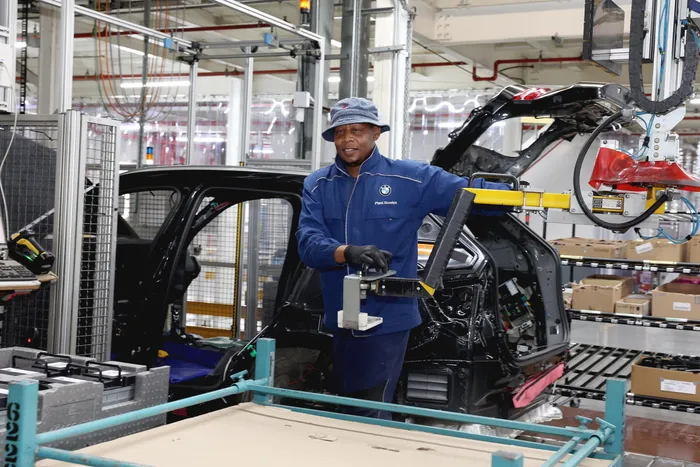
Over the past few years, BMW South Africa invested R4.2 billion into upgrading its Rosslyn plant near Pretoria to produce the plug-in hybrid version of the BMW X3 — the first NEV manufactured in South Africa for global export.
Image: GCIS
BMW South Africa has reaffirmed its commitment to driving the country’s automotive sector into an electrified future — even as policy uncertainty threatens to slow down momentum across the industry.
In an exclusive interview with Business Report on Tuesday, BMW South Africa CEO Peter van Binsbergen said the government’s delay in finalising and implementing the White Paper on New Energy Vehicles (NEVs) was holding back investment decisions for local automakers, warning that time is running out for South Africa to align with global trends.
South Africa's NEV White Paper, released in December 2023, outlines a 10-year strategy for the automotive industry to transition to electric vehicles (EVs). It outlines a roadmap for the local EV production ecosystem, developing charging infrastructure and battery value-chain development, and stimulating market demand through phased incentives and fiscal support.
“The lack of concretising this White Paper, the lack of adopting what the President [Cyril Ramaphosa] announced at SA Auto Week last year, is slowing down the transition,” said van Binsbergen.
“Many manufacturers are waiting for this updated paper to come out, which includes hybrids and incentives for consumers in South Africa to embrace NEVs. We are far behind the rest of the world embracing them locally. So it definitely is slowing down the market. If you ask the other brands, they'll tell you many of them are waiting for product decisions for the next product in their factories.”
This comes as the BMW Group hosted its 2025 Responsibility Days in Munich last week, which showcase how the company drives innovation, standardisation and the transition to a circular economy. The focus lies on systematic decarbonisation, particularly within the supply chain, as well as on digitalisation and the use of artificial intelligence.
The BMW Group is committed to the Paris Climate Agreement: The company aims to reduce its CO2 emissions by 90% from 2019 levels by 2050. To achieve this, the BMW Group is expanding its use of renewable energies in production, electrifying its vehicle fleet and investing in the use of renewable and secondary raw materials throughout the supply chain.
South Africa lags significantly behind global markets in the adoption of electric and hybrid vehicles.
While BMW already sells more than 20% of its total vehicle mix as fully electric in Europe, domestic uptake remains sluggish, a situation the carmaker says is linked to both affordability and limited policy clarity.
Despite these challenges, BMW has not stood still. Over the past few years, the group invested R4.2 billion into upgrading its Rosslyn plant near Pretoria to produce the plug-in hybrid version of the BMW X3 — the first NEV manufactured in South Africa for global export.
“We couldn’t wait for the paper to be finalised,” van Binsbergen explained. “We went ahead and invested because it made sense for us. Our Rosslyn plant now produces the plug-in hybrid X3 exclusively for the world, and production is at its highest level in history.”
He noted, however, that the depth of localisation in the supply chain could have been greater had there been stronger policy support and clearer incentives.
“However, had there been a more advanced White Paper available at the time, we might have been able to deepen the localisation. So we did what we could within the business case but the depth of localisation could have been deeper had there been a stronger support programme for NEVs.”
The urgency of the policy discussion is tied closely to South Africa’s export dependency.
Around 96% of BMW South Africa’s production is exported, with nearly three-quarters of that destined for Europe and the UK, markets that are set to ban the sale of new internal combustion engine (ICE) vehicles by 2035.
“If we don’t follow suit in production, we will lose our biggest market,” van Binsbergen warned. “We desperately need a comprehensive White Paper that’s ready for our next product decision. Otherwise, we might not be in a position to invest in going fully electric in the Rosslyn plant.”
According to the Automotive Business Council (Naamsa), the release of the EV White Paper and the introduction of an investment allowance for NEV investments should prove a crucial step in attracting investments, fostering innovation, and enhancing the growth of the automotive sector within South Africa.
The allowance, set to start in March 2026, allows for the claiming 150% of qualifying investment spending in the first year.
Meanwhile, van Binsbergen said the industry has had constructive engagement with both the Department of Trade, Industry and Competition (the dtic) and National Treasury, but progress on policy adoption has been slow.
Globally, BMW is preparing for a new generation of electric mobility through its “Neue Klasse” (German for “New Class”) platform, a major technological leap that promises up to 800km of range, 25% faster charging, and 20% improved energy efficiency.
Van Binsbergen said the Neue Klasse represents “a new benchmark” in automotive design and technology, one that will keep BMW competitive even as competition intensifies from Asia and other regions.
“The Neue Klasse brings electromobility to a point where range anxiety becomes a thing of the past,” he said. “It combines cutting-edge electric technology with a refreshed design language and a new, intuitive digital interface. This is a new generation for BMW.”
While full electric vehicles still represent a small fraction of South Africa’s car market, van Binsbergen believes the combination of advanced hybrids, improved infrastructure, and forward-looking local policy can make the transition both viable and beneficial.
“Electromobility will appeal to South Africans,” he said. “But we need the right framework in place to support it — from consumer incentives to local component development. The opportunity is there; we just have to move faster.”
BUSINESS REPORT